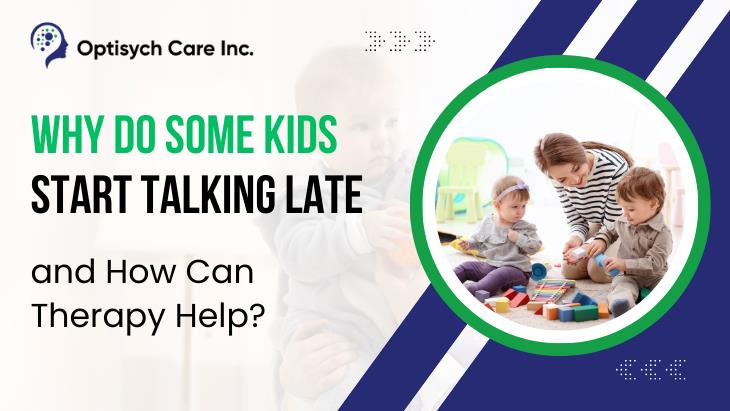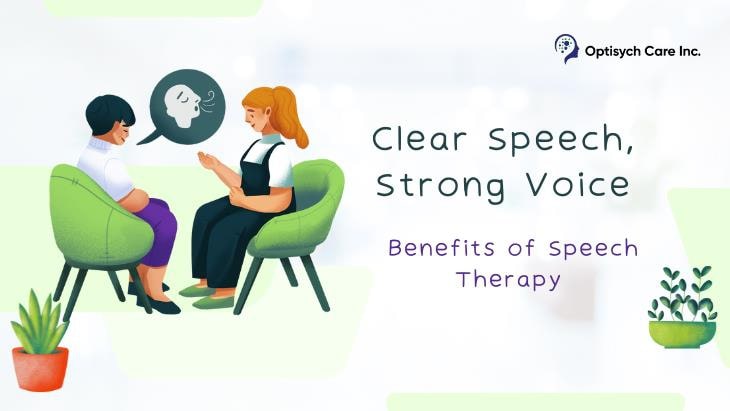Every parent anticipates the milestone of language development. Speech is a fascinating developmental stage that begins when a child says "mama" or "dada" for the first time and continues until they begin to form simple sentences. Not every child, though, adheres to the same schedule. Parents frequently worry when their children begin talking later than they should. Even though this delay might only last a short while, in other situations, professional assistance like speech therapy can be extremely helpful in assisting kids in catching up.
What Does Being a Late Talker Mean?
If a child uses fewer words and develops their language more slowly than other kids their age, they are said to be a late talker. Babies usually start babbling by the time they turn one year old, and by the time they are eighteen months old, they ought to be able to use multiple words. Most kids are putting words together to form simple phrases by the time they are two years old. Parents may observe that communication becomes difficult if their child falls well behind these developmental milestones. Some kids may require guided support, while others will naturally catch up on their own.
What Causes Some Children to Talk Lately?
There are many different causes of delayed speech. Hearing issues are among the most frequent causes. Even minor or recurrent ear infections can impair a child's ability to mimic sounds and pick up new vocabulary if they have hearing problems. Genetics also plays a significant role; some kids are just "late bloomers," and speech delays frequently run in families. When a child starts talking can also be influenced by growing up in a bilingual home. The initial words may be slower when processing two languages simultaneously, but in the long run, this improves the child's language abilities.
Late talking can occasionally be connected to developmental disorders like Down syndrome, autism spectrum disorder, or other cognitive delays. Early speech therapy intervention is typically very beneficial for children with these conditions. Since children need stories, songs, and conversation to develop their language skills, a lack of verbal stimulation at home may also be a factor. Lastly, speech delays can result from oral-motor problems, such as problems with the tongue or palate, which can make word formation more challenging.
Symptoms That Show a Child May Need Assistance
Even though each child develops at a different rate, there are some warning signs that point to the possibility of seeking professional assistance. A child may have delayed speech if they are not babbling or making gestures by the time they turn one year old, saying a few words by the time they are eighteen months old, or combining words by the time they are two years old. By the age of three, parents should think about seeking professional help if their child's speech is still very difficult to understand or if they have trouble interacting with others. Speech therapy may also be helpful for kids who avoid making eye contact, get frustrated when they can't communicate, or don't react when someone speaks to them.
How Late Talkers Benefit from Speech Therapy
Children who are late to talk can benefit greatly from speech therapy. The first step for a certified speech-language pathologist is to evaluate the child's communication abilities, such as vocabulary, comprehension, and pronunciation. A customized plan is developed in light of this assessment. Children are encouraged to use new words and phrases through entertaining, interactive activities like games, songs, and storytelling that are frequently incorporated into therapy sessions. These sessions gradually enhance one's vocabulary, sentence structure, and general communication abilities.
Therapists use oral-motor exercises to help kids who struggle with pronunciation by strengthening the muscles involved in clear speech. In order to help kids express themselves and lessen frustration, therapy also emphasizes alternate forms of communication, like picture boards or gestures. Parental involvement is a crucial step in the process. Simple activities and exercises that parents can do at home, like reading aloud, repeating words, and promoting conversations during everyday routines, are provided by speech therapists.
The Value of Prompt Intervention
Studies consistently demonstrate that children who start speech therapy before the age of three advance more quickly than those who start later. Early intervention increases social interaction, confidence, and preparedness for school in addition to improving communication skills. Children who have trouble expressing themselves frequently feel frustrated, but therapy helps them get past these obstacles and improve their ability to communicate their ideas and feelings. Parents can avoid long-term learning and communication challenges by addressing speech delays at an early age.
How Parents Can Encourage the Development of Speech at Home
A child's speech development is greatly influenced by their parents. Simple yet effective strategies to promote language development include reading picture books together, having frequent conversations, and narrating everyday activities. Children learn new vocabulary more easily when imitation is encouraged, such as by repeating words and extending them into short sentences. Limiting screen time is also crucial because active engagement is far more productive than passive listening. Above all, parents should exercise patience and give their kids ample opportunity to react and practice without feeling rushed. The progress made during speech therapy sessions is substantially enhanced by these modest but regular efforts at home.
When to Get Expert Help
Determining whether a child is merely a late bloomer or if there is a real delay that needs to be addressed can be challenging. Generally speaking, it is advisable to consult a professional if a child routinely fails to meet significant speech milestones, has trouble communicating, or becomes frustrated when speaking. A speech-language pathologist can offer a thorough assessment and treatment plan, while a pediatrician can rule out medical causes like hearing loss.
Conclusion
Optisych care: although each child's speech development is different and some may start talking later than others, communication skills are crucial for self-expression, relationships, and learning. Numerous factors, such as genetics, developmental disorders, hearing impairments, or a lack of language exposure, can cause delays. Thankfully, the majority of late talkers can overcome these obstacles and succeed with early speech therapy. Children are given the skills they need to communicate clearly and confidently when parental involvement is combined with professional guidance. Early intervention can ensure a bright and communicative future for your child if you are worried about their speech development.






Leave a reply